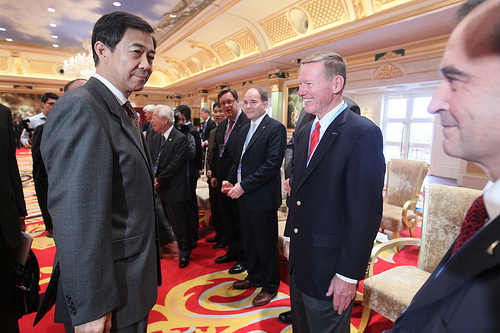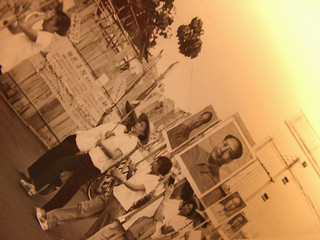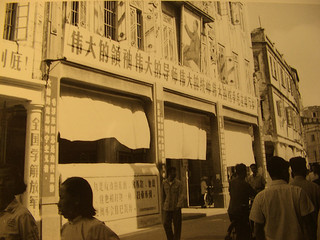By A. Nichols

On March 15th 2012, when Xinhua released the news that the political superstar, Party chief of Chongqing Bo Xilai was replaced by Vice Premier Zhang Dejiang, many people felt relieved. He was believed to be one of the most radical Maoist members in the Political Bureau, and his political moves in Chongqing indicated the resurgence of the Neo-Cultural Revolution. Chinese people are afraid of any signs of the Cultural Revolution in the 21st century because of what they learned from the ten-year long Cultural Revolution under Mao’s iron fist.
All classes of people suffered during the Cultural Revolution, including the Red Guards who almost took control of China’s cities from 1966 through 1968. The Red Guards were formed under Mao’s order and dismissed for the same reason. They were mainly teenagers who came from high schools and colleges, because the government abolished the higher education system, the Red Guards became the only occupation available to them. Schools became their battlefield: they humiliated their teachers, assaulted the “Five Black Categories”, smashed the “Four Olds”, and many innocent people lost their lives. The casualties also included many Red Guards who died in the “violence struggles” with other Red Guard “gangs”. After 1968, again, under Mao’s order, many of those young Red Guards turned into Rusticated Youth of China and went to the countryside to help build infrastructure and agriculture system. Far away from Beijing and other big cities, they were forced to stay in the countryside once they were married to the locals. Peasants and soldiers,who had highest social classes according to Mao, turned against these Rusticated Youths. They were used as laborers and many girls were raped by the officials. The trauma caused by this movement remained in their minds forever.

Ordinary people did not have a good time during the Cultural Revolution either. The unfortunate ones, who had connections with Taiwan or the United States, were likely to go to Struggle Meetings in their work units. These usually lasted for five hours daily according to Nian Cheng’s experiences. Some of them would go to prison, and others committed suicide in order to let their relatives survive. Cheng’s grandparents’ monthly salary remained at 105 yuan for ten years, but the price for livestock kept climbing. But it is still better than most of the families who lost their beloved during this nightmare.
- Street view during the Cultural Revolution photo by Yohei Yamashita
There were some high level Communist officials who didn’t escape from the terror of the Cultural Revolution, either. President Liu Shaoqi and Vice President He Long died in prison just because they had some opposite political views with Mao Zedong. Mao’s bootlickers, including the Gang of Four, used this opportunity to gain their political capital, while others like Zhou Enlai and Chen Boda were tried their best to save historical relics from the Red Guards’ destructions.


I think both those who experienced the Cultural Revolution, and are in positions of power right now, and those who were too young to experience, will play important roles in shaping China. Everyone should spend time learning what happened, though, whether they believe it had redeeming elements or was simply a colossal tragedy. Sometimes it’s hard to predict whether younger or older individuals will truly yield influence…
Five out of seven members of Politburo Standing Committee of the Communist Party of China went through as members of educated youth, they are the future leaders of China for ten years or at least five years, their Cultural Revolution experiences are going to affect their political moves. So the impact of the Cultural Revolution will play a very important role in the next ten years. For the same reason, the Tiananmen incident generation who are usually in their 40s right now will be affected by Tiananmen incident in the future.
The Cultural Revolution is not some thing Communist Party hide from people, almost all the Chinese know about the Cultural Revolution in someway. So i think everyone has a memory of the Cultural Revolution in their hearts. People memorize the Cultural Revolution as a lesson but not an opportunity for them to start the Cultural Revolution again (except for Bo Xilai and other extreme left wings) If it is what you mean by “revive”.
It’s interesting to learn that from the link “resurgence of the Neo-Cultural Revolution” :
“Bo Xilai’s “red song’ campaign was to facilitate his entry into the center of power in autumn this year-to show that he is the child of a high cadre and that his roots are red politically correct. He wanted to revive people’s memories of the violence of the Cultural Revolution.”
In my opinion, it’s not that possible to revive people’s “memories of the violence of the Cultural Revolution”, or at least not memories of all people.
Let’s do the math, people influenced most deeply of Cultural Revolution should be in their fifties or older than that. Nowadays, they can’t be the unstable part of the society, in other word, the revive of their memories to Cultural Revolution won’t influence China’s future that much.
In contrast, people in our generation, without memories of Cultural Revolution, play a more important role in society, deciding the future of China. However, this group of people are clearly aware of the danger of Cultural Revolution. They won’t follow the direction of Bo Xilai’s “Red Song”.